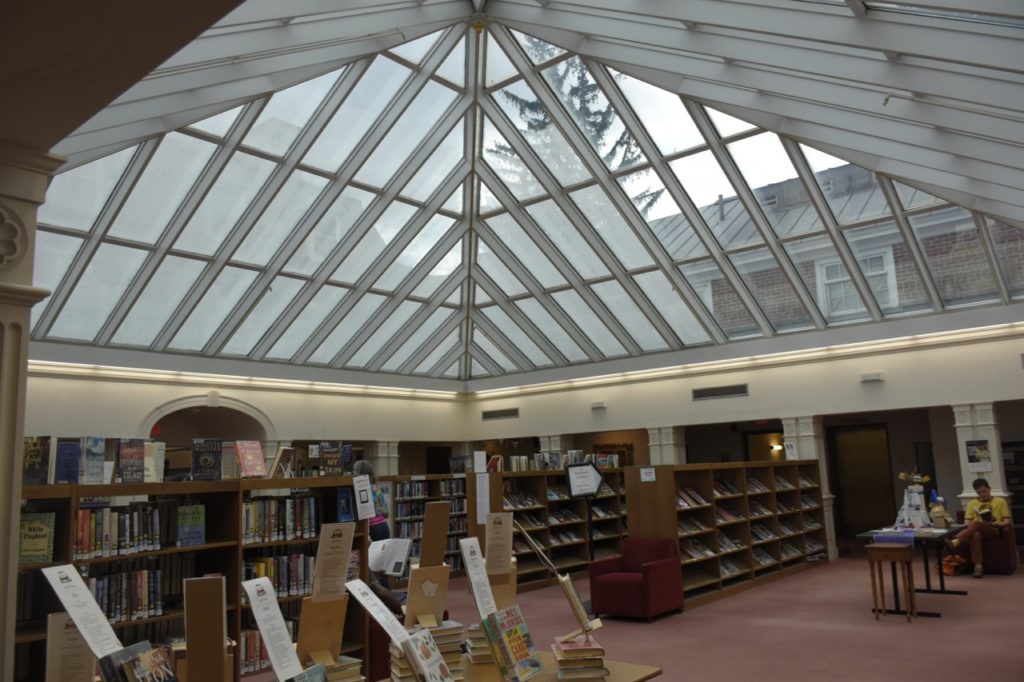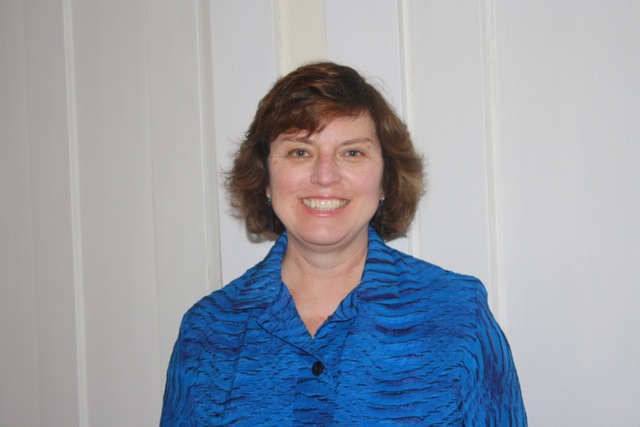Opinion: Jones Library Capital Campaign, Part 2: Why Such A Convoluted Process?

Atrium in the Jones Library constructed as part of a 1993 renovation. The atrium, which leaks, is slated to be demolished under the new expansion plan. Photo: Art Keene.

In Part 1, published last week, the goals of the Friends of the Jones Library System (Friends)’s capital campaign were delineated. The Friends are now in charge of solicitations for the Jones Library’s building proposal.
The Jones has raised only $556,000 toward the $6 million it has promised to contribute to the Town’s share of the demolition/expansion project, currently estimated at $22 Million. Although it has also secured a $1,000,000 Community Preservation Act grant, it has not yet been decided if this amount will be counted towards its $6 million commitment.
The Trustees have requested that the Town Council vote to approve the project before April 30, 2021, even though an anticipated grant from the Massachusetts Board of Library Commissioners (MBLC) will not be awarded until July 2021 at the earliest. The Trustees anticipate that the grant will pay for $13.8 million.
The current estimated cost of the project is $35.8 million if the construction begins this March. Costs may escalate as it could take up to a year after approval to develop the final design. The Town’s $22 million loan and the additional debt service on that loan will add considerably to taxpayers’ burdens.
The Trustees are also considering an additional $656,000 of energy saving measures, and funding options for that amount are unknown at this time.
A Complicated Campaign History
From 2014 to 2017, the Trustees explored how to fundraise for the Library’s building proposal by awarding five contracts to the Financial Development Agency (FDA), an Amherst-based development and marketing firm. Of the total contracts for $137,950, the amount expended $69,317, mostly for work categorized as “Building Project.”
FDA Principal Matt Blumenfeld and his colleague and wife, Grants Manager Claudia Canale-Parola, have also done significant pro bono work for the Library over many years, particularly in planning the Sammy Awards literary event, which garners about $20,000 for the Library each year.
One FDA contract in 2016 resulted in a Financial Feasibility Study, which ascertained through 56 unique interviews with 66 potential donors that $5 million could be raised from individuals for the project proposal. That expectation has since been reduced significantly, to $2,250,000.
A subsequent contract draft was presented at the end of 2016 to establish and complete a capital campaign by June 30, 2017. The final signed contract was pared down considerably to include only the following: organizing a Steering Committee, overseeing a records system, establishing outreach programs, managing communications with elected officials, developing materials to support the project, and conducting training sessions. The results of this work have never been shared with the public.
In 2018, the Jones entered into a Memorandum of Understanding (MOU) with the Friends that the latter non-profit would take over most aspects of fundraising for the Library’s annual fund. The announcement made to the public said that these arrangements would make fundraising clearer since only the Friends would be making solicitations instead of both entities.
The Friends have provided unwavering support of the Library for decades and are to be applauded for their steadfast dedication to support almost all of the Library’s programs.
Subsequently, in 2019, the Trustees and Friends entered into a second MOU to oversee all aspects of the capital campaign. The Trustees’ goal of the second MOU was surely to avoid the Open Meeting Law; as Trustee Lee Edwards asserted at the 11/9/17 Trustee meeting, a new 501(c)3 for capital fundraising might be needed, as “there may be an open meeting problem.”
This objective was also indicated in several months of Friends’ minutes, such as, “The Trustees are also concerned because bound by the Open Meeting Law, they will not be able to discuss frankly specific donors at their open meetings.” (2/12/18) Monthly minutes have not been readily available to the public.
Although the Trustees and the Friends each mentioned at separate meetings the possible need for counsel, it is not known if either party was legally advised about the two MOUs.
Meetings of the Friends and their subcommittees are not open to the public. Anyone who contributes is a “Friend” and their by-laws state that Friends are to be invited to the annual meeting. This writer is a “Friend,” but has not received invitations for the last three years. Several other “Friends” have also reported not receiving invitations.
We know so far that the Friends Fundraising Committee consists of Co-Chairs Lee Edwards (Trustee) and Kent Faerber (Friend) as well as Nancy Campbell (Co-President of the Friends). Edwards and Faerber are also Co-chair of the Friends Development Committee. It appears that Blumenfeld and/or Canale-Parola also attend Development Committee meetings. We do not know if there are other committee members.
How Does Amherst Forward Fit Into The Capital Campaign And What Are Their Priorities?
Faerber, Blumenfeld, and Canale-Parola are all Steering Committee members of Amherst Forward , Amherst’s only political action committee (PAC). According to its website, “Amherst Forward prioritizes getting all our elementary school children into appropriate learning environments ASAP” and two of its other key initiatives are to work toward “a broader tax base to normalize residential property taxes” and to work toward “a vibrant downtown and village centers.”
The Eight Town Councilors who were endorsed by this PAC constitute a Council majority. Current Council initiatives include changing zoning by-laws for increased density downtown, as well as Destination Amherst, a proposal to upgrade the North Common, finish Kendrick Park, build a parking garage,and construct a Performing Arts shed on the Commons.
The BID and the Chamber have stated that the Library must be a priority in order to attract more visitors downtown. The Chamber recently sponsored a “Fireside Chat” with Jones Director Sharon Sharry.
Several of these eight councilors, including Evan Ross and Steve Schreiber, have already voiced approval for the expensive Library demolition/expansion proposal even though no financial analysis has yet been completed by the Town concerning all capital project needs and other capital expenditures.
Is There A Contradiction In Amherst Forward’s Priorities?
If the PAC was truly formed to support a new school and school infrastructure, why put the library project first if a possible debt exclusion override for the Jones’ proposal would likely jeopardize passage of a second override , for the new elementary school, in just a couple of years?
All of us realize that the Jones is in dire need of substantial upgrades, and residents support the idea of a vibrant library. However, this demolition/expansion project was planned with little regard to the financial needs of the entire town. Many residents have put the new elementary school first. The Town also needs a Fire Station anda DPW, as well significant improvements to roads and sidewalks.
During the townwide listening sessions in December 2019, residents ranked the Jones Library project as the lowest priority of the four projects.
It’s too bad that the library got off to a bad start during initial planning by deciding, without a formal study, to demolish the entire 1993 addition, which is 40 percent of the current Jones, and gutting most walls, staircases, and woodworking in the original 1928 section. It will cost over $7,400,000 to replace just that square footage, never mind the cost of adding another 17,000 square feet. Does Amherst Forward really think that most taxpayers are able to pay for all of the proposed capital projects and expenditures?
What Are The Next Steps?
The Town Council just requested that the Jones Trustees provide detailed information concerning the proposal and the Library’s long-term financial picture. With so many capital projects and ongoing capital needs, the Council needs a better picture of the Library’s challenging finances and the impact of a much larger facility. When the Jones’ response is received, the numbers need to be carefully analyzed and vetted.
The Jones Trustees discussed the first draft of their response to the Council at their January 17 meeting, although the draft was not included in the agenda packet and was not screen-shared. The Jones Trustees did not record this meeting.
The Trustees hope to meet to approve their next draft and send it to the Council by 2/15 once the Director has consulted with Town staff, the project manager for the proposed construction as well as an historic tax credit consultant.
After receiving this information, the Council needs to analyze the viability of the project within the context of all the Town’s capital needs before voting on the proposed Library demolition/expansion project.
There is no rush to vote on the Library proposal. Once the MBLC awards a grant, the Council has up to six months to approve it and can also ask for a six-month extension. That would give the Council time to get a clearer picture of the costs for a new school building.
Let’s develop a capital plan for the town that honors what everyone wants, what everyone needs, and what everyone can afford. This means setting priorities through compromise, with transparency as well as extensive public engagement. Sadly, this has not yet occurred.
Terry S. Johnson is a retired Amherst teacher, blossoming poet, and a lifelong student of art, architecture, history, and languages.

1 thought on “Opinion: Jones Library Capital Campaign, Part 2: Why Such A Convoluted Process?”